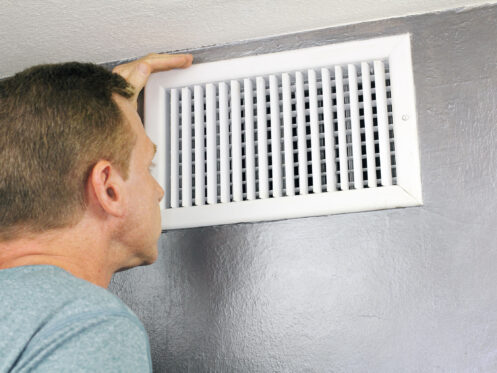There are lots of things that can go wrong with your cooling system, such as low refrigerant or dirty condenser coils. These issues can lead to major problems with airflow, comfort, and energy efficiency. Fortunately, with the right preventative approach, you can avoid these AC problems and many others.
Blocked Vents and Registers That Restrict Airflow and Cooling
If your home has hot and cold spots, the first thing you need to check is the air vents. There’s a chance someone accidentally left one or more closed, which will cause pressure imbalances and reduced comfort. There could also be rugs, curtains, or furniture blocking some of the vents. Keeping all of them open will ensure proper airflow and consistent temperatures throughout the whole house.
Restricted Airflow Caused by Dirty Air Filters
The air filter on your AC has the specific job of trapping airborne particles and preventing contaminants from entering the system. Over time, it will clog with hair, dust, pollen, and other debris. When this happens, the dirty filter will restrict airflow, causing the AC to use more energy to keep the home cool. This not only increases energy costs but also puts extreme wear on the AC.
There’s a very simple way to avoid this: check the filter once every 30 to 90 days and change it when it’s dirty. If you’re using a ductless AC, you need to change the filter every two weeks. Clean filters enhance airflow and do a great job of reducing allergy and asthma symptoms.
Frozen Evaporator Coils From Low Refrigerant
The refrigerant in your AC is in charge of absorbing heat from inside your home and releasing it outside. It plays a vital role in ensuring the cooling system operates efficiently and doesn’t overheat or break down. When there’s a leak, the refrigerant level will be low, which can lead to frozen evaporator coils. You might even notice ice forming around the indoor unit and weak airflow from the vents.
We’ll have to inspect the refrigerant lines and connections to see what’s causing the leak. For those caused by loose fittings or minor damage, we might be able to repair the leak and recharge the system. When the leak is the result of a corroded coil or cracked line, we’ll have to do a full component replacement.
Clogged Condensate Drain Lines Due to Algae Buildup
Your AC removes moisture from the air to help control humidity levels and improve indoor comfort. This moisture drains from the evaporator coil through a condensate drain line. However, as dust accumulates and moisture builds up, the line can become clogged with algae, mold, and dirt. When blocked, the moisture won’t have anywhere to drain. Instead, it will back up into the system or even leak into your home.
There’s an easy way to avoid this: simply clean the drain line with vinegar or a commercial cleaner once every few months. A technician can also flush the line during maintenance visits to prevent blockages and water damage.
Thermostat Issues Caused by Faulty Sensors or Miscalibration
Anytime the thermostat has faulty sensors, it will give inaccurate readings that throw off the normal cooling cycle of the AC. As it tries to cool the house with incorrect data, it will use more energy and endure more wear. We can replace the sensors and do a recalibration to restore accurate temperature control and improve efficiency. To prevent future problems, you will need to keep the thermostat clean and ensure it avoids direct sunlight exposure.
Dirty Condenser Coils From Lack of Cleaning
The outdoor part of the AC has a condenser coil that stays exposed to harsh elements, like dust, dirt, and leaves. When these elements build up on the coil, it affects how well the system can release heat. This is another problem that increases energy costs and wear on the AC. Regularly washing the outdoor unit every four months keeps the coil clean and boosts efficiency. When you do your rinsing, make sure to turn off the power first and avoid using high-pressure sprays directly on the coil. You don’t want to damage the fins or refrigerant lines.
Electrical Failures Triggered by Corroded Wires or Loose Terminals
Your AC has many wires and electrical connections that help it run properly. All of these connections must stay tight and secure to prevent loose terminals, worn relays, and corroded wires. Electrical faults from these issues translate into major problems like short cycling, blown fuses, and even complete system failure. Burning odors and buzzing or clicking noises are clear indicators of an electrical problem. Preventive maintenance and inspections can catch these issues early before they cause serious damage and expensive AC repair.
Capacitor Failure Caused by Overheating or Electrical Surges
The capacitor is what gives the AC the jolt of energy it needs to kick on. When this part becomes weak or burned out, it will cause the AC to make a humming noise and stop it from turning on. Electrical surges and overheating are the top causes of capacitor failure. We will have to test the charge of the capacitor and check the wiring and terminals to determine whether it needs a replacement.
Blower Motor Breakdowns From Dust Accumulation or Worn Bearings
Dust buildup and worn bearings will keep the blower motor from pushing air through the ducts evenly, which will create hot and cold spots throughout your home. You might even hear a squealing noise that signals worn-out bearings or belt issues. A rattling noise may come from a loose blower wheel or debris caught inside. If you put your hand over a vent, the air will likely come out very weakly. We can wipe down the blower assembly and do a bearing inspection during a maintenance check to keep airflow strong and prevent breakdowns.
Leaky Ductwork That Wastes Air and Reduces System Efficiency
Holes and cracks in your ductwork can allow up to 30% of the conditioned air to escape before it reaches your living spaces. This means higher energy costs and uneven temperatures. The best way to check for leaky ductwork is to inspect exposed ducts for signs of damage. Just take a flashlight and have a helper turn on the system to see if air is escaping from any joints or gaps. If you notice any whistling sounds, visible tears, or dust streaks, you’ll need to invest in duct sealing or insulation services.
Problems Caused by Improperly-Sized Units
Oversized setups constantly turn on and off because they cool the space too quickly without properly dehumidifying. This ends up causing serious issues with comfort and humidity control. An AC that’s too small will struggle to keep the whole home cool due to its lack of power capacity. This makes your energy bills spike and the entire system wear out faster. A professional installation is the best way to ensure you have the right-sized system.
The Experts Can Help
Coleman Mitchell Heating & Air Conditioning offers many types of cooling services, including tune-ups, installation support, and repair. Whether it’s a clogged filter or a frozen coil, we can help. Call Coleman Mitchell Heating & Air Conditioning now to book AC maintenance in Bridgeville, PA.







